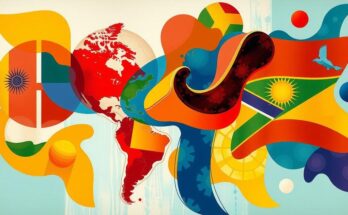Sam Nujoma, the leader of Namibia’s independence movement and its first president, died at 95. Recognized for his pivotal role in the country’s liberation from South Africa, Nujoma’s legacy includes significant political achievements and controversies during his presidency. Tributes from current leaders emphasize the foundation he laid for a unified Namibia.
Sam Nujoma, the esteemed leader of Namibia’s struggle for independence from South Africa, passed away at the age of 95. Known as a courageous guerrilla commander and the nation’s first democratically elected president, Nujoma’s death was announced by President Nangolo Mbumba in Windhoek. Mbumba honored Nujoma’s significant contributions, stating, “Our Founding Father lived a long and consequential life during which he exceptionally served the people of his beloved country.”
Born on May 12, 1929, in Ogandjera to Ovambo farmers, Nujoma was the eldest of 10 siblings. After initially working on the family farm, he moved 800 kilometers south in 1949 to secure employment as a railway sweeper in Windhoek. During this time, he began attending night classes and became politically active after meeting Hosea Kutako, who mentored him in opposing apartheid policies.
In 1960, at Kutako’s urging, Nujoma entered exile, leaving behind his wife and four children. As president of the South West Africa Peoples’ Organisation (Swapo), he tirelessly advocated for Namibia’s independence, culminating in Swapo’s armed struggle beginning in 1966, following South Africa’s refusal to relinquish its control per a UN mandate.
Namibia achieved independence in 1990, making it one of the last African nations to do so, and shortly thereafter, Nujoma was elected as the first president. During his three terms, he oversaw a period characterized by economic growth and political stability. Nonetheless, he faced criticism for his stance on rehabilitating former Swapo members and his opposition to homosexuality.
Nujoma’s successor, Hifikepunye Pohamba, assumed the presidency in 2005, but Nujoma remained a significant presence in Namibian politics. “He inspired us to rise to our feet and to become masters of this vast land of our ancestors,” President Mbumba reflected.
President-elect Netumbo Nandi-Ndaitwah commended Nujoma’s visionary leadership and his role in nation-building, stating that it established a foundation for a free and united Namibia. “Let us honour his legacy by upholding resilience, solidarity, and selfless service,” she asserted, as she prepares to be sworn in as the nation’s first female president.
Sam Nujoma played a crucial role in Namibia’s fight for independence from South Africa, leading the South West Africa Peoples’ Organisation (Swapo) and advocating for political change. His journey from an Ovambo farm to the presidency is marked by significant activism and leadership, which culminated in Namibia’s independence in 1990. Although he faced controversies during his presidency, his impact on the nation’s development is widely recognized and celebrated.
The passing of Sam Nujoma marks the end of an era for Namibia, as one of the key figures in the country’s struggle for independence is remembered for his leadership and contributions. His legacy continues to inspire Namibians, particularly in the context of resilience and nation-building. As the country prepares to welcome its first female president, Nandi-Ndaitwah, the foundations laid by Nujoma will undoubtedly influence future leadership and governance.
Original Source: www.rfi.fr




